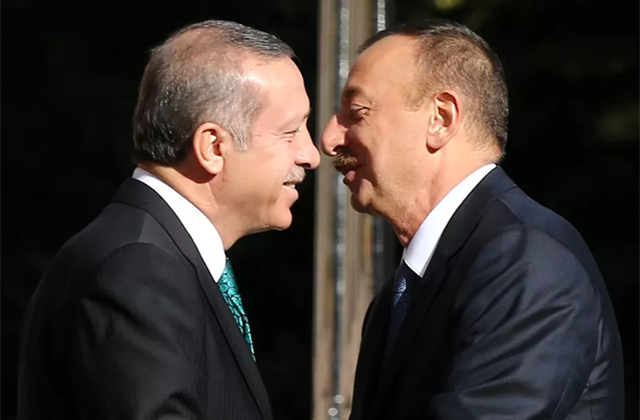Hollywood proposed to make propaganda films on Aliyev and Erdogan for a price

A team of investigative journalists from the Organized Crime and Corruption Reporting Project (OCCRP) revealed that a Hollywood producer planned to make propaganda films that would glorify several authoritarian leaders for a payment of millions of dollars.
Igor Lopatonok, a native of Ukraine who is now a US citizen, in collaboration with Oscar-winning filmmaker Oliver Stone, initially produced two documentaries on Ukraine which were described as “pro-Kremlin propaganda” and a highly flattering eight-part mini-series on Kazakhstan’s President Nursultan Nazarbayev.
In addition, Lopatonok planned to make several propaganda documentaries casting a positive light on the autocratic leaders of Azerbaijan and Turkey, among others. However, it is not clear if Stone would have been involved in any of these proposed projects. None of these documentaries were made.
OCCRP stated that Aliyev, Putin and Lukashenko “have all been accused of horrific crimes against the citizens of the countries they rule…. But where the world sees brutal dictators, Igor Lopatonok sees opportunity [to make money].” Since these authoritarian leaders were to pay for their propaganda documentaries, no mention would have been made of their brutal rule.
“One of Lopatonok’s glossy pitches, ‘Untitled Oliver Stone Documentary’ or ‘About Ilham Aliyev and Azerbaijan’, promises that Stone would ‘sit face to face’ with the Azerbaijani strongman [Aliyev] and cover not only ‘emerging of leader to the head of state rank, but all questions of colorful and fascinating history of Azerbaijan,’” OCCRP reported.
“Lopatonok seemed to have hit upon a promising formula. He had assembled a small team of screenwriters and producers who churned out film ideas to pitch to dictators, making an enticing offer: copious screen time with a world-famous director [Oliver Stone]. The key to ‘monetizing’ the process was simple, said an insider who worked on the team, and agreed to speak with reporters on condition of anonymity. Lopatonok had figured out how to offer powerful people something they couldn’t resist: Legitimacy on the world stage,” OCCRP wrote.
“In his pitch to Aliyev for the ‘Oliver Stone documentary,’ Lopatonok underscores that the planned film would ‘have a unique positive impact on publicity of the president and Azerbaijan.’ Although it’s unclear if Aliyev ever engaged with the pitch, an expert on Eurasia said it would be in line with the strongman’s previous efforts to present his regime as a dynamic, modernizing influence in the region. ‘I do see it as in line with all of these potential vectors of image washing — culture, sports, those are the big ones, and global events, global conferences,’ said Alexander Cooley, a political science professor at New York’s Barnard College and an expert on Eurasian transnational networks.”
It is obvious that a documentary made by Hollywood filmmakers touting the greatness of Aliyev would have much more credibility than the cheap propaganda produced in Azerbaijan.
“When authoritarian leaders get a Hollywood glow-up, it often comes at the expense of the people they rule over, said Casey Michel, head of the Human Rights Foundation’s Combating Kleptocracy Program. The foundation has spent years campaigning for Hollywood stars to stop working with dictatorial regimes. ‘I can’t imagine how dispiriting it must be for citizens in places like Kazakhstan … to watch this American director come and turn into a propaganda mouthpiece for their dictators,’ Michel said. These people know how horrific these regimes truly are — and then they watch this American parachute in, and gobble up all of the dictators’ talking points, without even bothering to push back,” OCCRP stated.
The funding to produce these documentaries is to be provided by the dictators “or people close to them.” In 2019, when Stone and Lopatonok produced the documentary “Qazaq: History of the Golden Man,” about Nursultan Nazarbayev, the President of Kazakhstan, a charitable foundation controlled by him paid the duo at least $5 million,” OCCRP reported.
Documents obtained by OCCRP reporters revealed that Lopatonok’s “team prepared synopses of potential films about at least six other authoritarian governments, including China, the United Arab Emirates, and the Russian republic of Tatarstan, alongside the pitches to Aliyev and Lukashenko, promising that Stone would interview their leaders and help tell their ‘true story.’”
Lopatonok’s team proposed that during his interview with Aliyev, Stone discuss “the country’s ‘success’ under the ‘dynastic rule’ of the Aliyev family, and its ongoing conflict with ‘an Armenia that is losing its stability and teetering on the edge of an abyss.’ A summary of the proposed film makes clear the tenor of Lopatonok’s approach: It describes Aliyev as a ‘true successor’ to his father, the previous president, who had taught him to be a ‘wise leader.’” The pitch asked: “Can you really call the existing state system in Azerbaijan a ‘Cult of Personality’? Or is it just a tribute of people’s respect to a leader who was able to turn the country from poverty into one of the developed, prosperous countries?” The film about Aliyev would cost $15 million, according to OCCRP.
Lopatonok told the Azeri media during his visit to Baku in 2021: “This country [Azerbaijan] has a very rich and colorful culture. When I was here in 2012-2013, I learned to distinguish the Karabakh carpets from all others, identifying [them] by their ornament. I would make a good film about Azerbaijan.”
There was another synopsis for a film on Turkish President Recep Tayyip Erdogan, “offering him a chance to tout his defense of Turkish interests.” Here is what the synopsis said: “Erdogan is a Turk and hardly needs to be basing his actions on the interests of other countries. But what interests does he have? Can he restore the Great Silk Road? And does he really have expansionist plans? What is Erdogan trying to achieve? He should answer these questions himself. And only himself. We should not try to divine [Erdogan’s plans] from coffee grounds, even if it is magnificent Turkish coffee that they know how to make only in Istanbul.”
“In a 2018 interview, Ibrahim Kalin, then the spokesman for Turkish President Recep Tayyip Erdogan, confirmed that they had received a pitch for a documentary about Erdogan around the same time Stone was in Turkey. ‘We are looking at it, we are evaluating it,’ he said,” OCCRP reported.
By Harut Sassounian
www.TheCaliforniaCourier.com

























